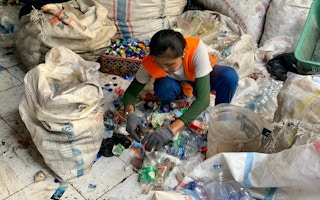Coca-Cola is struggling to source recycled plastic at a “reasonable price” in Asia, a company sustainability executive said at an event in Singapore.
To continue reading, subscribe to Eco‑Business.
There's something for everyone. We offer a range of subscription plans.
- Access our stories and receive our Insights Weekly newsletter with the free EB Member plan.
- Unlock unlimited access to our content and archive with EB Circle.
- Publish your content with EB Premium.
The US$98 billion brand has set targets to use more recycled plastic in its packaging to curb its impact on the environment, where millions of its bottles end up.
Speaking at The Economist’s Sustainability Week event on Tuesday (7 February), Russell Mahoney, Coke’s vice president of public affairs, communications and sustainability, Southeast Asia, Australia, New Zealand and the South Pacific, said the company was sometimes unable to access recycled plastic in Asia because supply had been “soaked up” by Europe.
In Europe, there is high demand for recycled plastic partly because of corporate sustainability commitments to use more recycled material and a levy the European Union placed on unrecycled plastic packaging in 2021.
Mahoney said that other consumer goods firms wanting to use more recycled content in their products have made it difficult to source recycled plastic at a “reasonable price” in Asia.
The price of virgin plastic has fallen relative to recycled plastic in recent years. The Covid-19 pandemic sent oil prices – and therefore the price of oil-derived virgin plastic – tumbling, and in Asia, the price of virgin plastic has fallen this year as the region has boosted imports of cheap Russian oil.
Coke – which has ranked as the world’s largest plastic polluter for the past five years – has pledged to use 50 per cent recycled content in its bottles by 2030. Competitors including PepsiCo, Unilever and Nestlé are pursuing similar targets to use more recycled plastic.
Mahoney said governments needed to “step in” to enable the better movement of plastic around the world to give corporates easier access to recycled content.
The construction of more recycling plants in Asia should help to bring the cost down as the industry scales up, he said. In many parts of developing Asia where Coke sells its products, recycling infrastructure is limited or absent.
The Sydney-based executive conceded that some of the cost of using pricier recycled resin would be passed on to the consumer. “Anything companies pay [for] ultimately gets passed on to the consumer. That’s the way business works,” he said.
He added that it was important that governments “level the playing field” for recycled plastic, so that it was not only multinationals like Coca-Cola “doing the right thing” and costs are shared.
Coke is “broadly supportive” of extended producer responsibility schemes, which holds producers responsible for the collection and re-use of materials, and a planned United Nations treaty to curb plastic pollution, Mahoney said.
Coke is only interested in “high quality” plastic, he added. “We’re not interested in [the type of] plastic that goes into carpets or clothing.”
The company uses polyethylene terephthalate (PET), one of the easiest types of plastic to recycle, to manufacture its bottles.
Mahoney’s comments came in the same week as a study by Minderoo, a non-profit, revealed that of the 6 million tonnes of single-use plastic produced between 2019 and 2021, 98 per cent of it was made from virgin fossil fuels, and only 2 per cent from recycled material.
PET price pushback
Speaking to Eco-Business after the event, Alvaro Aguilar, head of business development and logistics for Prevented Ocean Plastic, a Bali-based recycler, said consumer goods firms like Coca-Cola should not expect to pay lower prices for recycled content.
Discounted recycled plastic would mean penalising the informal waste pickers in South and Southeast Asia who depend on PET to make a living, he said.
“Waste collectors are the ones solving [consumer goods companies’] waste problem. We can’t ask waste pickers to lower their very basic living needs just so that consumer goods firms can more easily achieve their procurement targets.”
“There is actually a lot of capacity for processing and recycling plastic in Asia, but limited capacity for collection. If prices [of recycled plastic] are lowered for waste pickers, they will collect other materials instead.”
Tom Peacock-Nazil, chief executive of Seven Clean Seas, a plastic clean-up and credits firm, said that if brands like Coke were not willing to pay a premium for recycled plastic, there would be no incentive to build the additional recycling infrastructure needed for supply to meet demand.
In 2019, a Coke executive said that Southeast Asia’s leaky waste collection systems were making it difficult for the company to meet its targets for recycled content. Coke, like Pepsi, has struggled to meet its recycling targets in the past, a 2022 report by non-profit Planet Tracker highlighted.










